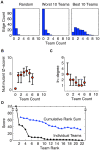Towards a rigorous assessment of systems biology models: the DREAM3 challenges
- PMID: 20186320
- PMCID: PMC2826397
- DOI: 10.1371/journal.pone.0009202
Towards a rigorous assessment of systems biology models: the DREAM3 challenges
Erratum in
- PLoS One. 2010;5(3). doi: 10.1371/annotation/f633213a-dc4f-4bee-b6c5-72d50e7073b8
Abstract
Background: Systems biology has embraced computational modeling in response to the quantitative nature and increasing scale of contemporary data sets. The onslaught of data is accelerating as molecular profiling technology evolves. The Dialogue for Reverse Engineering Assessments and Methods (DREAM) is a community effort to catalyze discussion about the design, application, and assessment of systems biology models through annual reverse-engineering challenges.
Methodology and principal findings: We describe our assessments of the four challenges associated with the third DREAM conference which came to be known as the DREAM3 challenges: signaling cascade identification, signaling response prediction, gene expression prediction, and the DREAM3 in silico network challenge. The challenges, based on anonymized data sets, tested participants in network inference and prediction of measurements. Forty teams submitted 413 predicted networks and measurement test sets. Overall, a handful of best-performer teams were identified, while a majority of teams made predictions that were equivalent to random. Counterintuitively, combining the predictions of multiple teams (including the weaker teams) can in some cases improve predictive power beyond that of any single method.
Conclusions: DREAM provides valuable feedback to practitioners of systems biology modeling. Lessons learned from the predictions of the community provide much-needed context for interpreting claims of efficacy of algorithms described in the scientific literature.
Conflict of interest statement
Figures








References
-
- David LA, Wiggins CH. Benchmarking of dynamic bayesian networks inferred from stochastic time-series data. Ann N Y Acad Sci. 2007;1115:90–101. - PubMed
-
- Camacho D, Vera Licona P, Mendes P, Laubenbacher R. Comparison of reverse-engineering methods using an in silico network. Ann N Y Acad Sci. 2007;1115:73–89. - PubMed
-
- Cantone I, Marucci L, Iorio F, Ricci MA, Belcastro V, et al. A yeast synthetic network for in vivo assessment of reverse-engineering and modeling approaches. Cell. 2009;137:172–181. - PubMed
Publication types
MeSH terms
Grants and funding
LinkOut - more resources
Full Text Sources
Other Literature Sources

